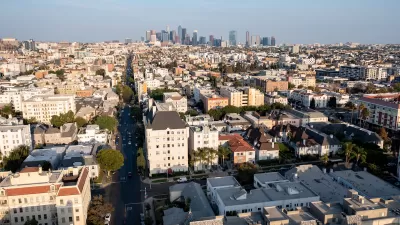New data shows that the city of Los Angeles owns nearly 9,000 parcels throughout the region—and that it could be doing a lot more with them.

For the first time in a decade, the city of Los Angeles has a comprehensive catalog of its own real-estate portfolio, and it comes in the form of an interactive, searchable map.
Controller Ron Galperin—a former real-estate attorney—published PropertyPanel.LA along with a memo urging city leaders to realize the transformative potential of its nearly 9,000 parcels.
"The real-estate assets of the city are vast, and they could be delivering a tremendous amount of value to the residents, the businesses, and the taxpayers of LA," he told The Planning Report. "It’s long overdue that that happens."
In fact, the memo suggests the creation of a new position—Chief Asset Manager—with the authority to undertake construction, sales, leases, development, joint ventures, and "all the aspects of real-estate management."
"It should be someone with a good amount of private-sector experience, because the mindset it requires is not just about doing RFPs and RFQs," Galperin says. "It’s about doing deals."
The report notes that previous accounts of municipal assets were "incomplete, inadequate, outdated, and in some cases incorrect." Galperin tells The Planning Report that putting the new data into an easily accessible map "helps to turn everybody into partners in holding the city accountable."
After all, he says, publicly owned property should be used in the service of the public—as parkland, as housing for the homeless, or indirectly, as a source of municipal revenue.
Fulfilling that ideal will require some long-term planning, and it's time to get started, Galperin says:
I don’t believe in selling, leasing, or joint-venturing property just to close a budget gap in a particular year. We have to meet strict standards about the value that the deal will deliver over the long term. Plus, we want to get input from a lot of different stakeholders about the best thing to do with particular properties.
But here’s the thing: The city owns so many properties that even if we did only a somewhat better job with just some of them, we’d be well ahead of where we are now.
FULL STORY: LA Controller Galperin Makes Transparent LA City’s "Underutilized" Properties

Planetizen Federal Action Tracker
A weekly monitor of how Trump’s orders and actions are impacting planners and planning in America.

San Francisco's School District Spent $105M To Build Affordable Housing for Teachers — And That's Just the Beginning
SFUSD joins a growing list of school districts using their land holdings to address housing affordability challenges faced by their own employees.

The Tiny, Adorable $7,000 Car Turning Japan Onto EVs
The single seat Mibot charges from a regular plug as quickly as an iPad, and is about half the price of an average EV.

Seattle's Plan for Adopting Driverless Cars
Equity, safety, accessibility and affordability are front of mind as the city prepares for robotaxis and other autonomous vehicles.

As Trump Phases Out FEMA, Is It Time to Flee the Floodplains?
With less federal funding available for disaster relief efforts, the need to relocate at-risk communities is more urgent than ever.

With Protected Lanes, 460% More People Commute by Bike
For those needing more ammo, more data proving what we already knew is here.
Urban Design for Planners 1: Software Tools
This six-course series explores essential urban design concepts using open source software and equips planners with the tools they need to participate fully in the urban design process.
Planning for Universal Design
Learn the tools for implementing Universal Design in planning regulations.
Smith Gee Studio
City of Charlotte
City of Camden Redevelopment Agency
City of Astoria
Transportation Research & Education Center (TREC) at Portland State University
US High Speed Rail Association
City of Camden Redevelopment Agency
Municipality of Princeton (NJ)




























